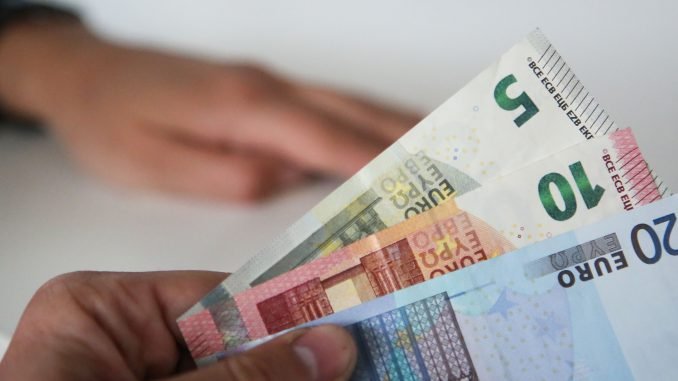
According to programme Lietuvos Ženklai (Signs of the Times) at lrytas.lt the Lithuanian economy is now stagnant and has faced many challenges over the past year, but it is neither growing nor shrinking – a state of stagnation that has been in place for a couple of years.
This is how the Head of the Bank of Lithuania (LB), G. Šimkus, described the situation at the end of 2023.
According to the LB’s assessment, the country’s BVP (GDP) contracted by only 0.2% last year compared to 2022. However, in September, this indicator was forecasted to be a bit worse – a contraction of 0.6%.
However, LB’s forecasts for this year’s economic growth are slightly more modest than a few months ago, with BVP (GDP) expected to grow by 1.8% instead of 2.1%.
Still, this is a step forward. The economic recovery observed over the last three months also heralds the end of the economic stagnation.
All this shows that the Lithuanian economy is relatively resilient to the negative impact of global conflicts and that businesses are better prepared for difficult times than in previous crises.
This is primarily due to the country’s employment and real income growth – according to the LB, wages rose by 12.2% last year, while inflation has been on a sharp downward trend, and last November, after just above 2%, was about ten times lower than at the same time the previous year.
However, these statistics are compared with very high price hikes for 2022, so real personal income in purchasing power parity terms has yet to reach the peak in 2021, although it is already 8% above the pre-pandemic 2019 figure.
Exports, the main engine of the Lithuanian economy, contracted last year. This forced the industry to slow down, but production has continued to fall over the past three months, even in the hardest-hit furniture, wood and plastics sectors.
Unemployment, which is now just above 6%, is not rising – the same as before the pandemic in 2019. This means that companies are struggling to keep workers on the payroll, even as exports have fallen, which shows that manufacturers are looking forward to this year and expect demand for their products to increase.
When external conditions are unfavourable for business, domestic consumption can help avoid a recession.
On the other hand, people spend less in challenging times because they are more worried about the future and are more reluctant to borrow, significantly if the cost rises as sharply as in recent years.
Naturally, average per capita consumption in Lithuania has fallen compared to the peak year of 2021, but it is now reaching 2019 levels.
What is the barometer of public sentiment that is important for consumption at the start of this year?
The Baltic Research survey, commissioned by Lietuvos Rytas in 1995, answers this question.
33% of respondents described the past year as personally successful. This is the best figure since the pandemic.
In Lithuania, only in the pre-pandemic year of 2019, there were 10% more optimists. Then, the purchasing power of the population also rose rapidly. This had an impact on people’s assessment of their success.
Usually, the personal success rate is higher than the corresponding country rating. Still, in the years when Lithuania has been unsuccessful, people’s attitudes towards their family’s well-being have also declined.
Only 13% of the country’s population called last year successful for Lithuania. Only the pandemic and record inflation years of 2020-2022 seemed even worse, but this is the most pessimistic assessment in a decade apart from this period.
As many as 43% of the respondents saw 2023 as a failure for the country.
In people’s opinion, the past year was not so bad for Lithuania compared to other countries – 60% of Lithuanians called it unsuccessful for the world. In comparison, only 5% called it successful.
These sentiments are probably influenced not only by the ongoing fighting in Ukraine but also by Israel’s war against Hamas terrorists.
The year before last, Lithuanians were particularly frightened by the rising cost of fuel and other raw materials, which is why global estimates for 2022 were even slightly worse. Now, worries about heating, electricity, and gas prices have receded somewhat. Still, insecurity and the threat of war have increased, prompting people to describe the past year as gloomy for the world again.
In any case, the poll shows that more people expect a slightly better year for Lithuania and the world.
Pessimistic forecasts have fallen slightly, while optimism has increased.
19% of people expect a successful 2024 for Lithuania – 6% more than in the previous year. Almost as many Lithuanians predict success for the world next year as for their own country – 17%, which is 12% more optimistic than last year.
However, there are more pessimistic opinions than optimistic ones: 35% of Lithuanians predict that this year will be unsuccessful for the world and 37% for Lithuania.
It is well known that public expectations affect reality and often come true, especially in the economic sphere.
Of course, Lithuanians cannot predict geopolitical conflicts or influence them with their moods. However, I hope this year will be better for the world. Lithuania and their families might help the country overcome stagnation.
Polls show that the public’s hopes for better times are slowly gaining ground, albeit tentatively.


Be the first to comment